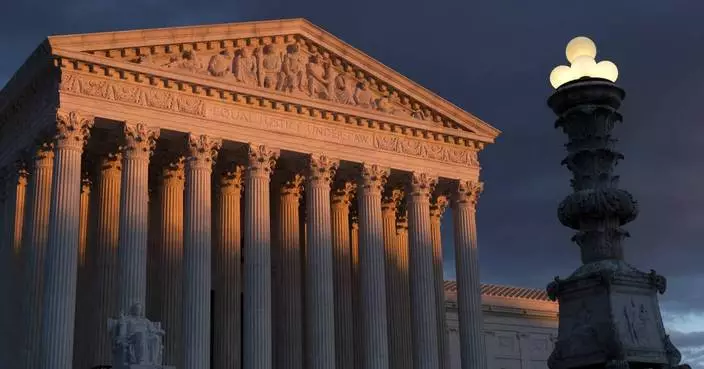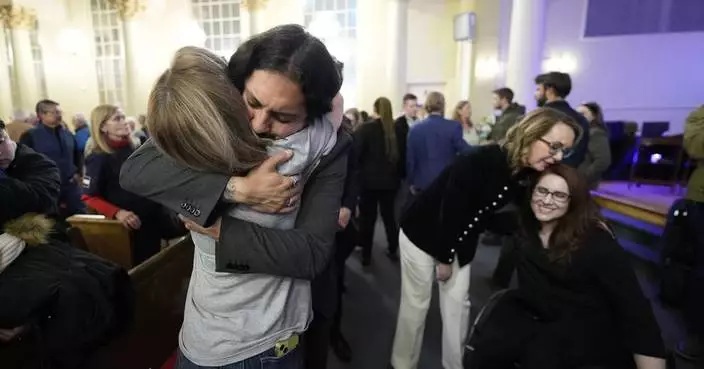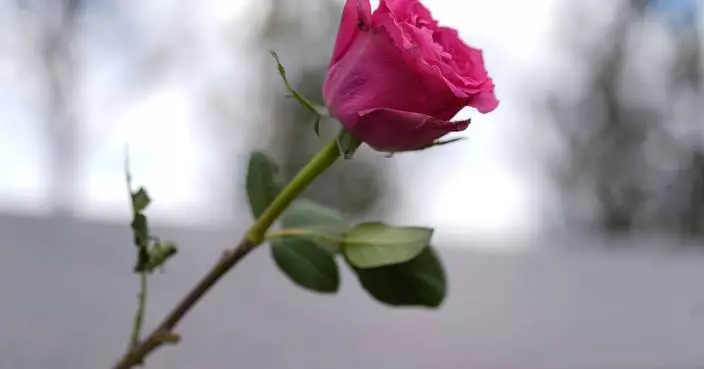Britain marked the 70th wedding anniversary of Queen Elizabeth II and her husband Prince Philip on Monday with a peal of bells, a set of portraits and some commemorative stamps.
The then-Princess Elizabeth married naval officer Lt. Philip Mountbatten at Westminster Abbey on Nov. 20, 1947, in a Britain physically and economically ravaged by World War II. Wartime Prime Minister Winston Churchill described the ceremony as "a flash of color on the hard road we travel."
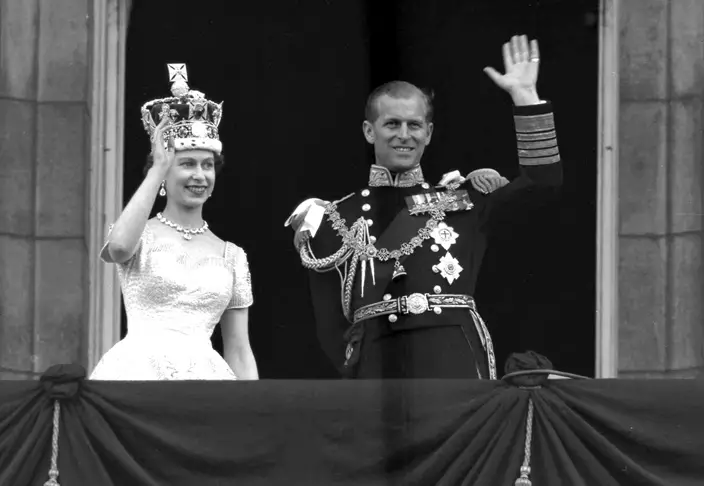
FILE - This is a June. 2, 1953 file photo of Britain's Queen Elizabeth II and Prince Philip, Duke of Edinburgh, as they wave to supporters from the balcony at Buckingham Palace, following her coronation at Westminster Abbey. London. (AP Photo/Leslie Priest, File)
Elizabeth became queen in 1952. Now 91, she is the first British monarch to reach a platinum anniversary.
Philip, who is 96 and also holds the title Duke of Edinburgh, has spent the ensuing decades supporting his wife in her role as head of state. At their 50th wedding anniversary, Elizabeth praised her husband as "quite simply... my strength and stay all these years."
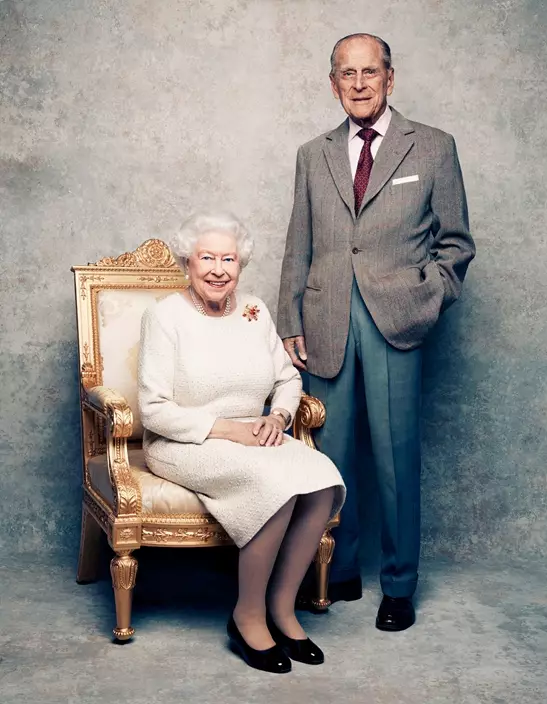
In this handout photo issued by Camera Press and taken in Nov. 2017, Britain's Queen Elizabeth and Prince Philip pose for a photograph in the White Drawing Room pictured against a platinum-textured backdrop at Windsor Castle, England.(Matt Holyoak/Camera Press via AP)
The royal family is reportedly holding a gathering at Windsor Castle to celebrate Monday's anniversary. The royal couple has four children, eight grandchildren and five great-grandchildren.
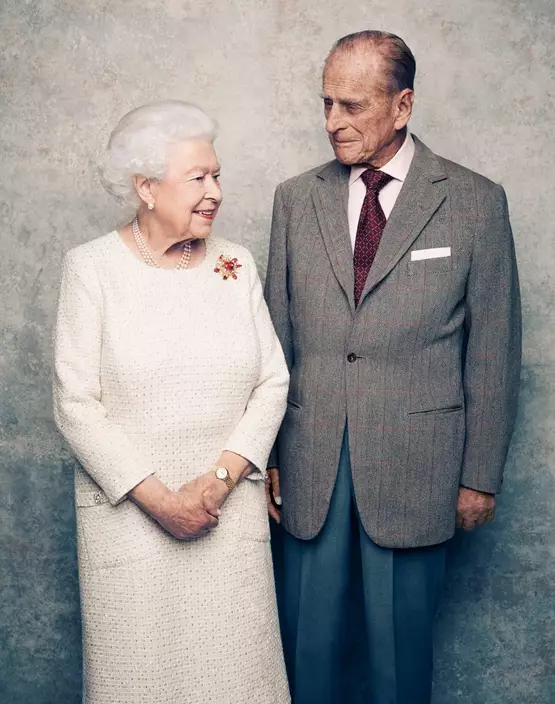
In this handout photo issued by Camera Press and taken in Nov. 2017, Britain's Queen Elizabeth and Prince Philip pose for a photograph in the White Drawing Room pictured against a platinum-textured backdrop at Windsor Castle, England. (Matt Holyoak/Camera Press via AP)
Buckingham Palace marked the occasion by releasing several new portraits of the couple, taken in the White Drawing Room at Windsor Castle by photographer Matt Holyoak.
The Royal Mail has issued a series of commemorative stamps. And at Westminster Abbey, bell-ringers sounded a full celebratory peal — lasting more than three hours — in tribute.
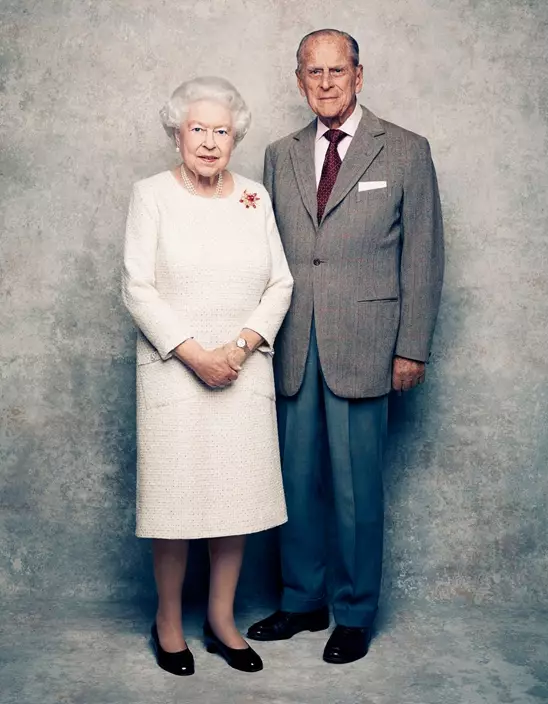
In this handout photo issued by Camera Press and taken in Nov. 2017, Britain's Queen Elizabeth and Prince Philip pose for a photograph in the White Drawing Room pictured against a platinum-textured backdrop at Windsor Castle, England. (Matt Holyoak/Camera Press via AP)
JOHANNESBURG (AP) — As 72-year-old Nonki Kunene walks through the corridors of Thabisang Primary School in Soweto, South Africa, she recalls the joy she and many others felt 30 years ago when they voted for the first time.
It was at this school on April 27, 1994, that Kunene joined millions of South Africans to brave long queues and take part in the country's first democratic elections after decades of white minority rule which denied Black people the right to vote.
The country is gearing up for celebrations Saturday to mark 30 years of freedom and democracy. But much of the enthusiasm and optimism of that period has subsided as Africa’s most developed economy faces a myriad of challenges.
Like many things in South Africa, the school that Kunene remembers has changed, and what used to be a school hall has now been turned into several classrooms.
“I somehow wish we could go back to that day, because of how excited I was and the things that happened thereafter,” said Kunene, referring to Nelson Mandela becoming the country's first Black president and the introduction of a new constitution that afforded all South Africans equal rights, abolishing the racially discriminative system of apartheid.
For many who experienced apartheid, those years remain etched in their collective memory.
“I cannot forget how we suffered at the hands of whites. In the city at night, there were white bikers with hair like this (describing a mohawk-like hairstyle) who would brutally assault a Black person if they saw them walking on a pavement. Those white boys were cruel," said 87-year-old Lily Makhanya, whose late husband died while working in the anti-apartheid movement’s underground structures.
"If they saw you walking on the pavement, you would be assaulted so badly and left for dead."
For Makhanya and many others who stood in those queues to vote in 1994, it represented a turning point from a brutal past to the promise of a prosperous future.
But 30 years later, much of that optimism has evaporated amid the country's pressing challenges. They include widening inequality as the country's Black majority continues to live in poverty with an unemployment rate of more than 32%, the highest in the world.
According to official statistics, more than 16 million South Africans rely on monthly welfare grants for survival.
Public demonstrations have become common as communities protest against the ruling African National Congress' failure to deliver job opportunities and basic services like water and electricity.
An electricity crisis that has resulted in power blackouts that are devastating the country's economy added to the party's woes as businesses and homes are sometimes forced to go without electricity for up to 12 hours a day.
Areas like the affluent Johannesburg suburb of Sandton, which hosts beautiful skyscrapers and luxurious homes, are an example of the economic success enjoyed by a minority of the country's 60 million people.
But the township of Alexandra, which lies a few kilometers (miles) from Sandton, is a stark reflection of the living conditions of the country's poor Black majority, where sewage from burst pipes flows on the streets and uncollected rubbish piles up on pavements.
Such contradictions are common across the major cities, including the capital Pretoria and the city of Cape Town, and they remain at the center of what is expected to be one of the country's most fiercely contested elections in May.
For the first time since the ANC came to power in 1994, polls are indicating that the party might receive less than 50% of the national vote, which would see it lose power unless it manages to form a coalition with some smaller parties.
For some younger voters like 24-year-old Donald Mkhwanazi, the nostalgia does not resonate.
Mkhwanazi will be voting for the first time in the May 29 election and is now actively involved in campaigning for a new political party, Rise Mzansi, which will be contesting a national election for the first time.
“I had an opportunity to vote in 2019, and in local elections in 2021, but I did not because I was not persuaded enough by any of these old parties about why I should vote,” he said.
“I didn't see the need to vote because of what has been happening over the past 30 years. We talk about freedom, but are we free from crime, are we free from poverty? What freedom is this that we are talking about?"
Political analyst Pearl Mncube said South Africans are justified in feeling failed by their leaders.
“More and more South Africans have grown skeptical of pronouncements from government due to its history of continuously announcing grand plans without prioritizing the swift execution of said plans,” Mncube said.
She said while Freedom Day is meant to signify the country’s transition from an oppressive past, it was important to highlight current problems and plans to overcome them.
“We cannot use the past, and any nostalgia attached to it, to avoid accounting for the present,” she said.
AP Africa news: https://apnews.com/hub/africa
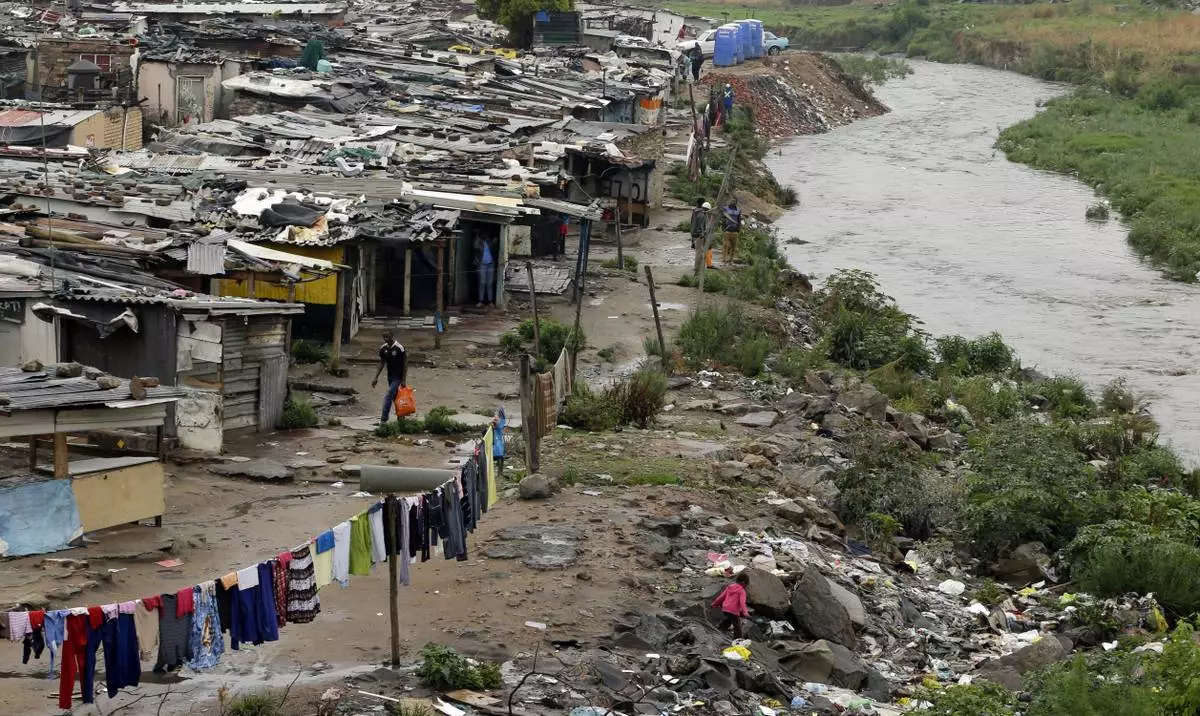
FILE — A man walks along an informal settlement as a young girl plays next to the polluted Jukskei River in Alexandra, northern Johannesburg, South Africa Nov. 11, 2014. On Saturday, April 27, 2024 the country will celebrate Freedom Day when In 1994 people braved long queues to cast votes after years of white minority rule which denied Black South Africans the right to vote. (AP Photo/Themba Hadebe/File)
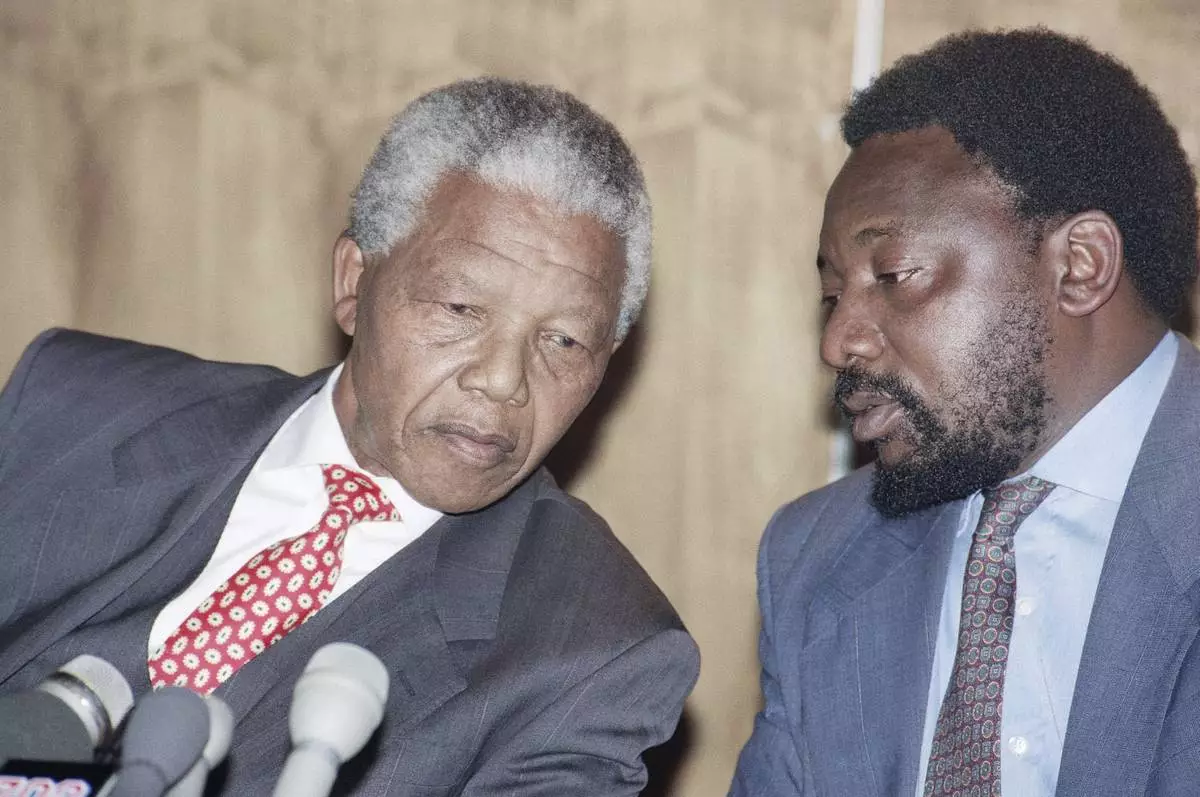
FILE — Then African National Congress President Nelson Mandela, left, and secretary general Cyril Ramaphose, now South African President, right, at a news conference in Johannesburg Monday, August 30, 1993. On Saturday, April 27, 2024 the country will celebrate Freedom day when In 1994 people braved long queues to cast votes after years of white minority rule which denied Black South Africans the right to vote. (AP Photo/Denis Farrell/File)
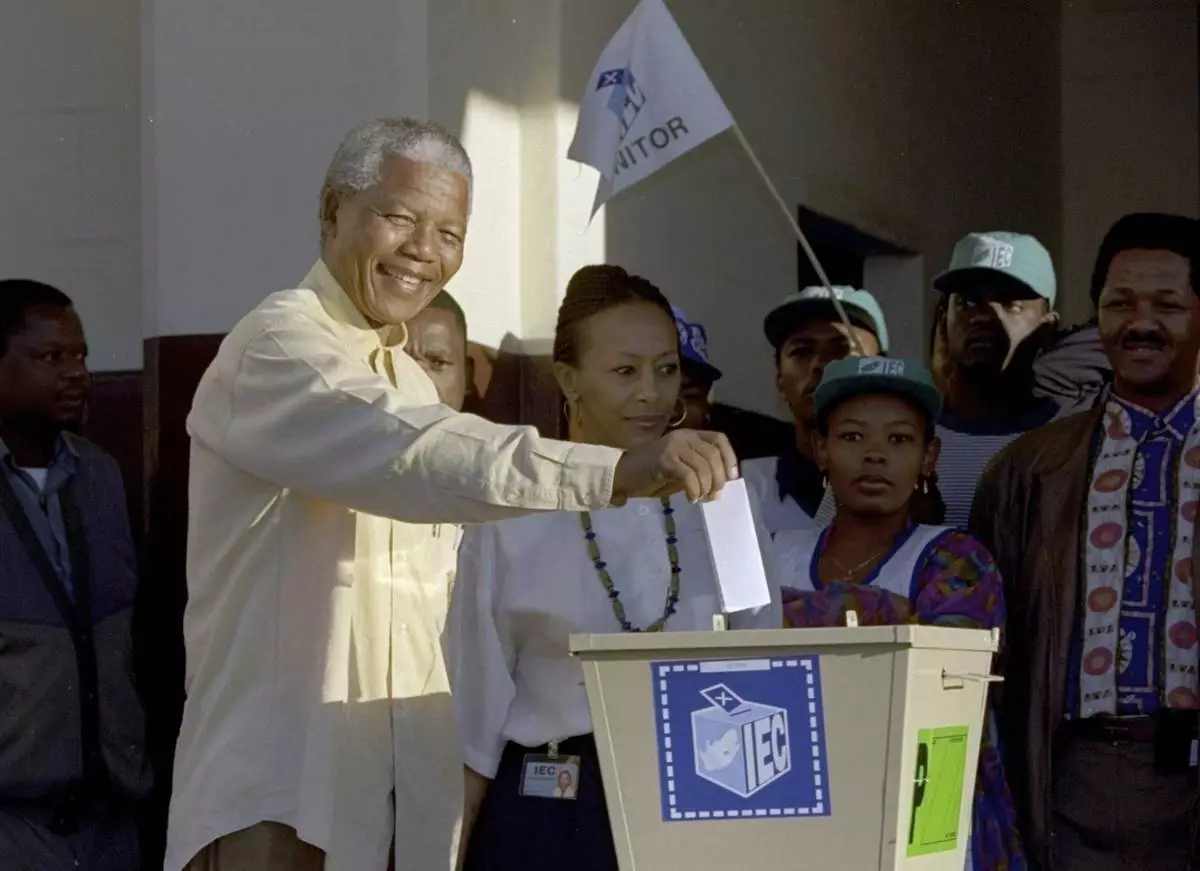
FILE - Then African National Congress leader, Nelson Mandela casts his vote April 27, 1994 near Durban, South Africa, in the country's first all-race elections. In 1994 people braved long queues to cast votes after years of white minority rule which denied Black South Africans the right to vote. (AP Photo/John Parkin. File)
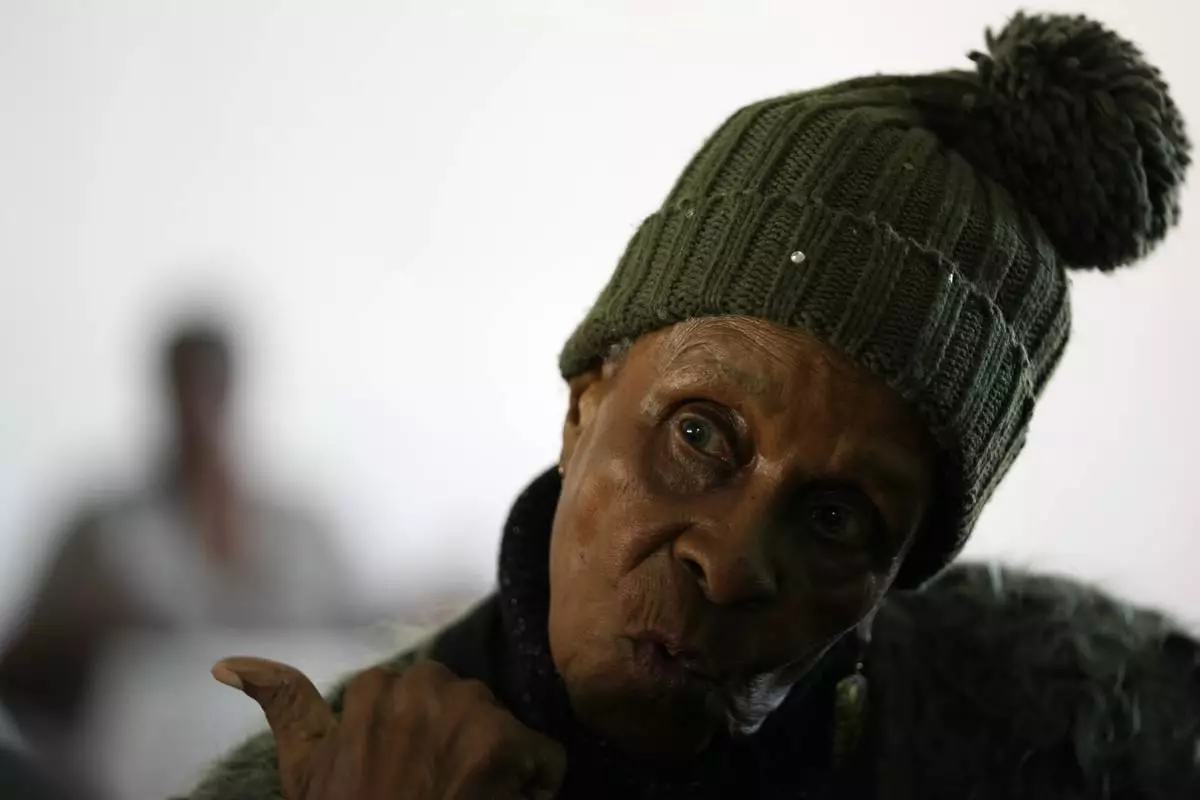
Nonki Kunene during an interview with The Associated Press in Soweto, South Africa, Monday, April 22, 2024. Thirty years ago Kunene joined thousands of South Africans who braved long queues to cast a vote in South Africa's first ever elections after years of white minority rule which denied Black South Africans the vote. (AP Photo/Themba Hadebe)
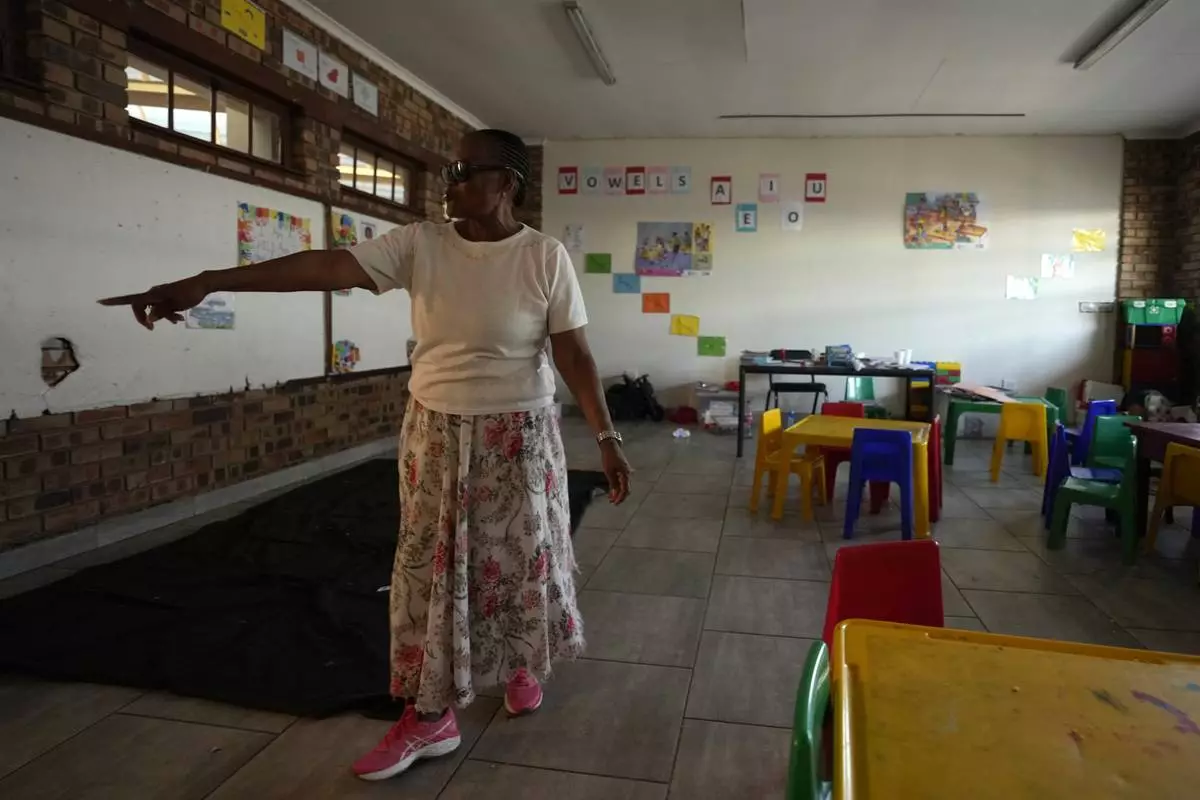
Lily Makhanya at the Thabisang Primary School where she voted for the first time 30 years ago, in Soweto, South Africa, Monday, April 22, 2024. In 1994 Makhanya joined thousands of South Africans who braved long queues to cast a vote in South Africa's first ever elections after years of white minority rule which denied Black South Africans the vote. (AP Photo/Themba Hadebe)
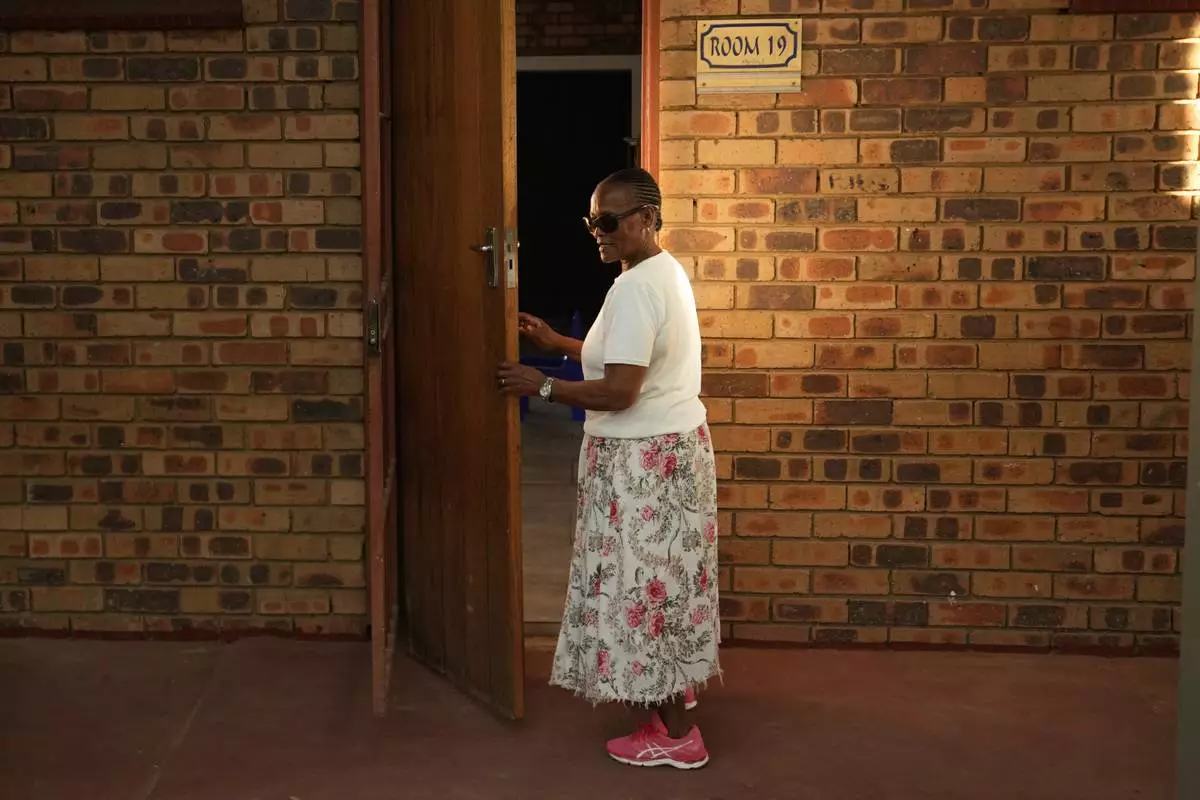
Lily Makhanya opens the classroom door at Thabisang Primary School where she voted for the first time 30 years ago, in Soweto, South Africa, Monday, April 22, 2024. In 1994 Makhanya joined thousands of South Africans who braved long queues to cast a vote in South Africa's first ever elections after years of white minority rule which denied Black South Africans the vote. (AP Photo/Themba Hadebe)
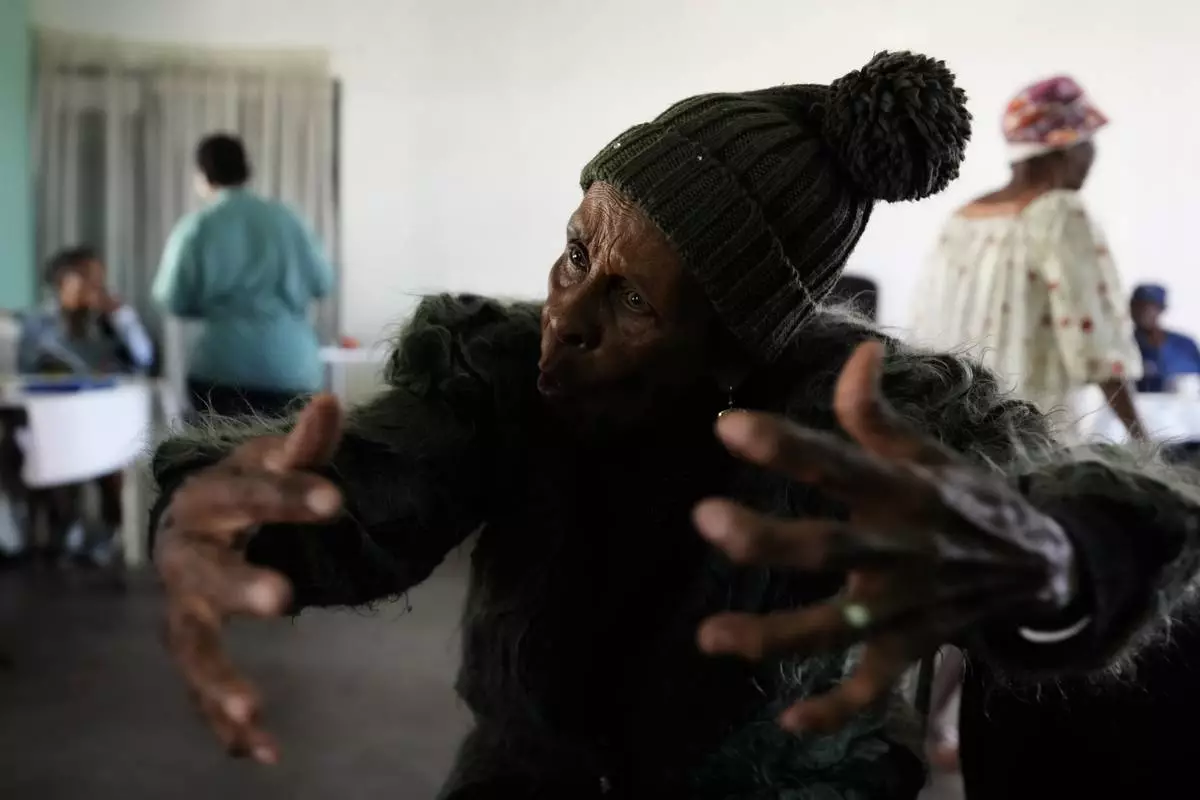
Nonki Kunene during an interview with The Associated Press in Soweto, South Africa, Monday, April 22, 2024. Thirty years ago Kunene joined thousands of South Africans who braved long queues to cast a vote in South Africa's first ever elections after years of white minority rule which denied Black South Africans the vote. (AP Photo/Themba Hadebe)
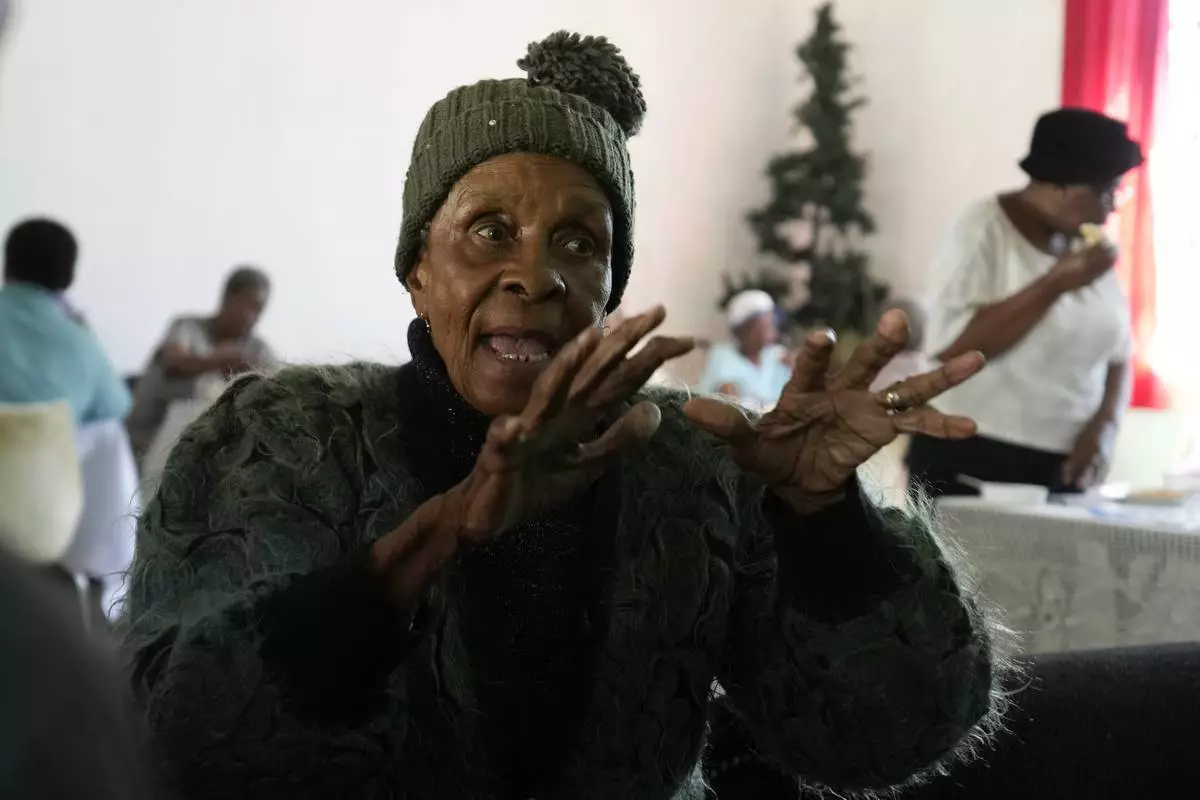
Nonki Kunene during an interview with The Associated Press in Soweto, South Africa, Monday, April 22, 2024. Thirty years ago Kunene joined thousands of South Africans who braved long queues to cast a vote in South Africa's first ever elections after years of white minority rule which denied Black South Africans the vote. (AP Photo/Themba Hadebe)
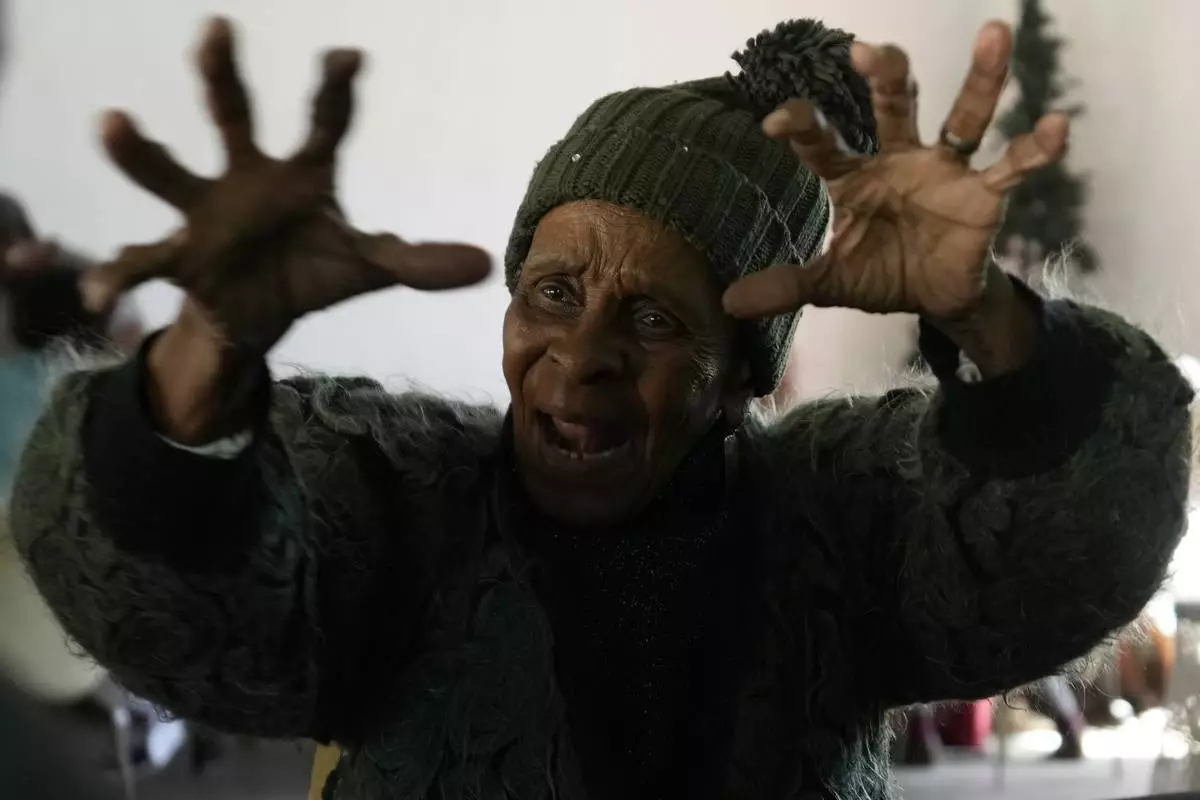
Nonki Kunene during an interview with The Associated Press in Soweto, South Africa, Monday, April 22, 2024. Thirty years ago Kunene joined thousands of South Africans who braved long queues to cast a vote in South Africa's first ever elections after years of white minority rule which denied Black South Africans the vote. (AP Photo/Themba Hadebe)
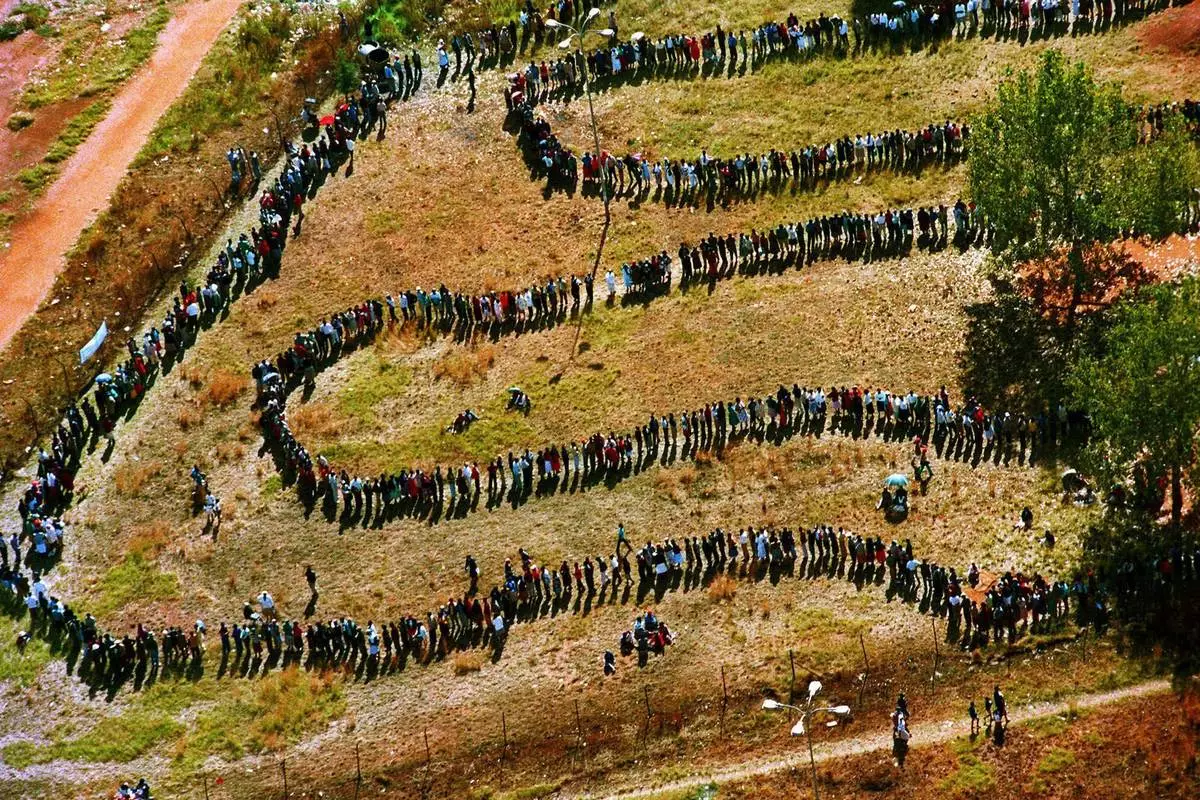
FILE - People queue to cast their votes In Soweto, South Africa April 27, 1994, in the country's first all-race elections. In 1994 people braved long queues to cast a vote after years of white minority rule which denied Black South Africans the vote. (AP Photo/Denis Farrell. File)


















